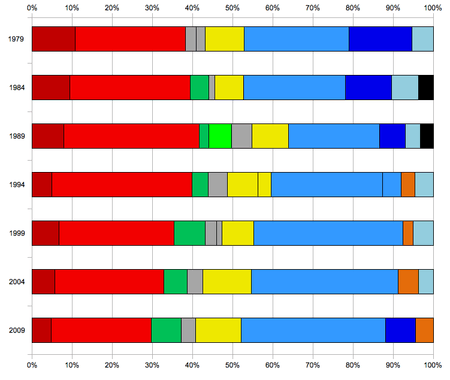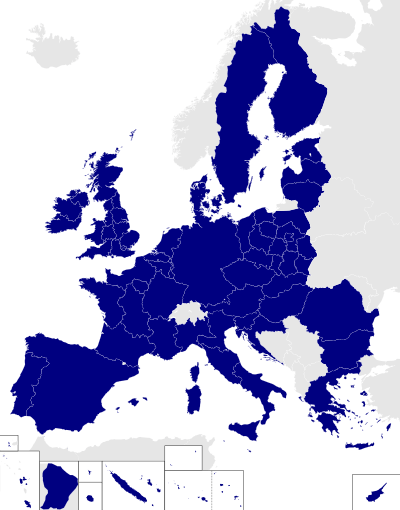European Ombudsman
| European Ombudsman | |
|---|---|
|
European Ombudsman logo | |
| Appointer | European Parliament |
| Inaugural holder | Jacob Söderman |
| Formation | 1995 |
| Website | ombudsman.europa.eu |
| European Union |
 This article is part of a series on the |
Policies and issues
|
Elections
|
The European Ombudsman (or sometimes Euro-Ombudsman) is an ombudsman for the European Union, based in the Salvador de Madariaga Building in Strasbourg.
History
The European Ombudsman was established by the Maastricht Treaty and the first, Jacob Söderman of Finland, was elected by Parliament in 1995. The current Ombudsman, Emily O'Reilly of Ireland, took office on 1 October 2013.
Appointment
The European Ombudsman is appointed by the European Parliament. He is appointed for the term of Parliament and his term is renewable. At the request of Parliament, the Ombudsman may be removed by the Court of Justice if "he no longer fulfils the conditions required for the performance of his duties or if he is guilty of serious misconduct". (Article 228 of the Treaty on the Functioning of the EU)
Remit and powers
Any EU citizen or entity may appeal the Ombudsman to investigate an EU institution on the grounds of maladministration: administrative irregularities, unfairness, discrimination, abuse of power, failure to reply, refusal of information or unnecessary delay. The Ombudsman can not investigate the European Court of Justice in its judicial capacity, the General Court, the Civil Service Tribunal, national and regional administrations (even where EU law is concerned), judiciaries, private individuals or corporations.[1]
The Ombudsman has no binding powers to compel compliance with his rulings, but the overall level of compliance is high. The Ombudsman primarily relies on the power of persuasion and publicity.[2] In 2011, the overall rate of compliance by the EU institutions with his suggestions was 82%. The EU Agencies had a compliance rate of 100%. The compliance rate of the European Commission was the same as the overall figure of 82%, while the European Personnel Selection Office (EPSO) scored 69%.[3]
Cases
It is a right of an EU citizen, according to the EU treaties, to take a case to the Ombudsman.[4] One example of a case dealt with by the Ombudsman involved a late payment from the Commission to a German science journalist. The Commission explained the delay, paid interest and accelerated future payments to experts. On another occasion, following a complaint from a Hungarian, EPSO agreed to clarify information in recruitment competition notices concerning eligibility and pre-selection tests. A third case was resolved when the Ombudsman compelled the Council to release to the public documents it had previously not acknowledged the existence of.[1]
The ombudsman received 2,667 complaints in the year 2010 and opened 335 investigations into alleged maladministration. In 2011 2,510 complaints were received and 396 investigations were opened. The largest number of complaints in 2011 came from Spain (361), followed by Germany with 308. Relative to population, however, the greatest proportion of complaints came from Luxembourg and Cyprus.[5] The United Kingdom, despite its eurosceptic reputation, was in 2009 responsible for the smallest amount of cases lodged.[2] In 2011 the UK was responsible for 141 complaints to the Ombudsman, still representing a relatively low ratio of complaints to population.[5]
According to the Ombudsman's own reports, 58% of complaints in 2011 were related to the European Commission. 11% related to the European Personnel Selection Office (EPSO) from dissatisfied applicants to the European Civil Service and 4% to the European Parliament. The Council of the European Union accounted for 3%.[5]
See also
- European Citizens' Initiative, an initiative aimed at increasing direct democracy in the European Union.
References
- ↑ 1.0 1.1 "The European Ombudsman—At a glance". ombudsman.europa.eu. July 2006. Retrieved 18 December 2012.
- ↑ 2.0 2.1 Mackie, Christopher (18 March 2010). "The EU's 'invisible man' who has power over all our lives". The Scotsman.
- ↑ "Report on responses to proposals for friendly solutions and draft recommendations—How the EU institutions complied with the Ombudsman’s suggestions in 2011". ombudsman.europa.eu. 2012. Retrieved 18 December 2012.
- ↑ "
 Part Two: Non-Discrimination and Citizenship of the Union".
Part Two: Non-Discrimination and Citizenship of the Union".  Consolidated version of the Treaty on the Functioning of the European Union. Wikisource. 2007. Article 20.
Consolidated version of the Treaty on the Functioning of the European Union. Wikisource. 2007. Article 20. - ↑ 5.0 5.1 5.2 "European Ombudsman's Overview 2011" (PDF). 2012. doi:10.2869/5243. ISBN 978-92-9212-326-0. Retrieved 18 December 2012.
External links
- The official website of the European Ombudsman,
- The European Code of Good Administrative Behaviour, at the Ombudsman's official website
- Public service principles for the EU civil service, at the Ombudsman's official website



